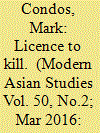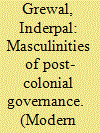|
|
|
Sort Order |
|
|
|
Items / Page
|
|
|
|
|
|
|
| Srl | Item |
| 1 |
ID:
144224


|
|
|
|
|
| Summary/Abstract |
Through a description of the interactions of Christian missionaries in Chhotanagpur with the Oraons, this article illustrates the different ways in which the missionaries grappled with and restructured their notions of the ‘tribe’ and the ‘Oraon’ across the nineteenth and early twentieth centuries. The Oraon, I argue, was initially recognized in terms of his heathen practices, his so-called compact with the Devil, and his world of idolatry and demonology. But, by the end of the nineteenth century, he increasingly became, in missionary language, an animistic aboriginal tribe, a ‘primitive’ within an evolutionary schema. As the missionaries searched for an authentic Oraon language, for myths, traditions and histories, an array of categories—heathen, savage, race, tribe, and aboriginal—seemingly jostled with one another in their narratives. Indeed, the tension between religion and race could never be resolved in missionary narratives; this was reflected in colonial ethnographic literature that drew upon and yet eventually marginalized missionary representations. I conclude by referring to a case in the 1960s filed by Kartik Oraon against the Protestant convert David Munzni before the Election Tribunal at Ranchi, which was ultimately resolved in the Supreme Court, that raised the question whether religion or race determined tribal identity.
|
|
|
|
|
|
|
|
|
|
|
|
|
|
|
|
| 2 |
ID:
144230


|
|
|
|
|
| Summary/Abstract |
The history of mass political formation in post-colonial metropolitan India has generally been narrated through the optic of ‘competitive electoral mobilization’ of the ‘poor’. How then are we to explain cases of successful mobilization in the terrain of ‘political society’ when some population groups are yet to, or just beginning to, constitute themselves as ‘vote bank’ communities? This article invites us to look into the organizational dimensions of subaltern politics in contemporary urban India. It also prompts us to re-examine the relation between law and subaltern politics. In this light, the article presents some of the major findings of a larger historical anthropology project on the organized mobilization of footpath hawkers in Calcutta since the 1970s. It examines the ways in which the hawkers have acquired and aggregated crucial resources to sustain prolonged anti-eviction movements. In this connection, this article makes a critique of the Street Vendors (Protection of Livelihood and Regulation of Street Vending) Act, 2014.
|
|
|
|
|
|
|
|
|
|
|
|
|
|
|
|
| 3 |
ID:
144226


|
|
|
|
|
| Summary/Abstract |
In examining the remarkable expansion of India's textile production in the late colonial period, many scholars have identified consumption trends as shaping the relative success of mills as opposed to handlooms. That scholarship, however, has focused on only one component of consumption: clothing. This article explores another important area of cloth consumption in western India: non-clothing textiles. Across classes, urban dwellers used curtains and furnishing fabrics to try to improve comfort and create privacy—two qualities in short supply in cities like Bombay and Ahmedabad, where the pressures of rapidly growing populations came into conflict with new sanitary demands to open up houses to light and air. More broadly, non-clothing textiles helped to negotiate the novel conditions of urban life, where people moved regularly, homes were increasingly open to non-kin visitors, men and women shared space in new ways, and elite women were aesthetic arbiters of domestic space. While clothing choices in the late colonial period have often been studied in the context of nationalism, this article argues that nationalism was only one factor among many that shaped the use of household furnishing fabrics; equally, or more importantly, new ideas of ‘home’ led to and were expressed in expanded fabric use in urban western India.
|
|
|
|
|
|
|
|
|
|
|
|
|
|
|
|
| 4 |
ID:
144225


|
|
|
|
|
| Summary/Abstract |
In 1867, the Government of India passed one of the most brutal-minded and draconian laws ever created in colonial India. Known as the ‘Murderous Outrages Act’, this law gave colonial officials along the North-West Frontier wide powers to transgress India's legal codes in order to summarily execute and dispose of individuals identified as ‘fanatics’. Arguments for the creation and preservation of this law invariably centred around claims about the purportedly ‘exceptional’ character of frontier governance, particularly the idea that this was a region that existed in a perpetual state of war and crisis. Far from being peripheral in its impact, this article explores how this law both drew upon and enabled a wider legal culture that pervaded India in the wake of 1857. It argues that this law was a signal example of British attempts to mask the brute power of executive authority through legalistic terms, and was also evocative of a distinctly ‘warlike’ logic of colonial legality.
|
|
|
|
|
|
|
|
|
|
|
|
|
|
|
|
| 5 |
ID:
144228


|
|
|
|
|
| Summary/Abstract |
This article examines the memoirs of Indian Civil Service officers as they continued to work in what became the Indian Administrative Service after independence. Rather than being understood solely as historical archives, these texts constitute a genre that can be called the ‘bureaucratic memoir’ which reveals masculinities that are both colonial and post-colonial. These memoirs, and their publication decades after independence reveal attempts by elites to preserve the power of the bureaucracy into subsequent decades. The texts hope to disavow but instead also reveal the patriarchal intimacies of these elites, even as these were challenged by charges of corruption and failure which emerged almost from the first moments of independence.
|
|
|
|
|
|
|
|
|
|
|
|
|
|
|
|
| 6 |
ID:
144231


|
|
|
|
|
| Summary/Abstract |
Between the late 1950s and the 1960s, a significant community of Indians appeared in Seria, an oil town in Brunei. Most of these Indians were recruited from India by the British Malayan Petroleum Company to staff its company offices in the wake of the rehabilitation of the Seria oilfields after the end of the Japanese occupation of Borneo. However, in official hagiographies of the Sultanate and historical accounts of Brunei, the Indians of Seria are invisible. Juxtaposed against this silence in the historical record, I pose the narrative agency of these Indians in asserting their place in the emergence of the modern state of Brunei and in historicizing their presence in a frontier oil town in Borneo. This article is based on extensive fieldwork in India, where most of these Indians retired to after decades of expatriate life in Brunei. Recalling their work and youth in Seria, they collectively claim an ‘origin’ in Seria while improvising a Brunei-Indian diaspora in India through their shared memories. In the absence of an archival record for the Indians in Seria, this article seeks to affirm the historical value of story-telling and diasporic remembering in recording a partisan genealogy of migration and settlement.
|
|
|
|
|
|
|
|
|
|
|
|
|
|
|
|
| 7 |
ID:
144227


|
|
|
|
|
| Summary/Abstract |
These days the rule of law is often invoked in Burma. Although its contemporary salience is partly a consequence of recent global trends, the rule of law also has lineages in the country's colonial and early post-colonial periods. To examine these lineages, this article distinguishes between its procedural and substantive conceptions. Whereas the latter conception recognizes the subjects of law as freely associating equals, the former is compatible with a range of political practices, including those that are undemocratic. The records of decisions in criminal cases before Burma's superior courts during the period of British domination suggest that some semblance of procedural rule of law did exist, and that it was compatible with the rule of colonial difference. Out of this procedural rule of law a nascent, substantive type emerged during the early years of democratic life in the post-colony, before the onset of military dictatorship. The article concludes that more effort to structure interpretations of the rule of law in history might better enable discussion about the concept's continued relevance.
|
|
|
|
|
|
|
|
|
|
|
|
|
|
|
|
| 8 |
ID:
144229


|
|
|
|
|
| Summary/Abstract |
In the decade and a half following Korean liberation from Japan in 1945, a category of men prowled Seoul's back alleys and also its halls of power. These figures might be called street leaders, for they were directly linked on one hand to private agents of violence and on the other to the top state and political elites of the country. The most notorious individuals included Kim Tu-han, a gang leader who became an elected politician, and Yi Chŏng-jae, a ‘political gangster’ who helped party politicians with their dirty work. Street leaders like Kim and Yi were on the scene at key moments in the republic's early political development. An examination of the political careers of Kim and Yi reveals how important cooperation between such actors and elite politicians was to state-building, political mobilization, and design of electoral institutions—processes that created the contemporary South Korean polity. Both the alliances between politicians and street leaders as well as the destruction of those alliances left deep impressions on South Korean politics.
|
|
|
|
|
|
|
|
|
|
|
|
|
|
|
|
|
|
|
|
|